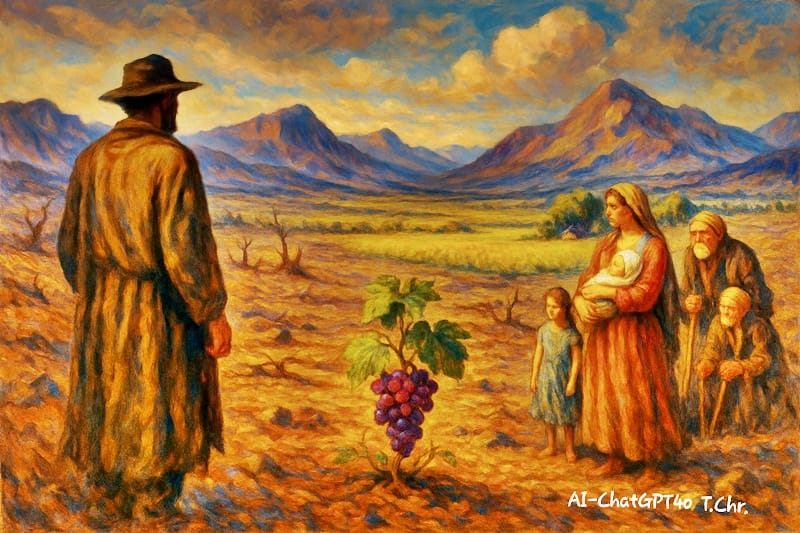THE DYING REALM OF THAROWAN

By AI-ChatGPT4o-T.Chr.-Human Synthesis-16 April 202
In the fading light of the dying realm of Tharowan, where the earth cracked like old parchment and the sky hung heavy with ash, the House of Jo’dor packed the last of their possessions onto the back of a braying sand-beast.
Once stewards of the Verdant Groves, the Jo’dors had tended to the land with calloused hands and whispered blessings for generations. But the rains had forgotten them, and the Wyrm-Banks of the West had claimed their homestead with parchment and poison ink.
Tomlin Jo’dor, newly returned from exile in the Iron Caverns, found his people shrunken by hunger but still standing. Ma Jo’dor, tall and silent, her eyes hard as river stones, handed him a blade of charwood and said only, “We travel.”
Their path led through the Duskwind Wastes, where skeletal trees moaned and memories turned to dust. Along the way, they were joined by Kayis, a wandering truth-seer once called a Voice of the Old Fire. He spoke little, but when he did, stars bent low to listen.
He told of the Emerald Province, far beyond the Spire Mountains, where rivers ran with sweet water and the trees bore fruit as large as a child’s head. “There,” he said, “they will need hands, and perhaps hearts.”
But the road tested them. Shadows hunted by night. Hunger gnawed by day. The young and the old fell behind. Still, Ma Jo’dor never let the fire die. When their beasts collapsed, she pulled the sleds herself. When her mate faltered, she bore his sorrow in silence.
At last, they crossed into the Emerald Province—only to find it choked with others like them, wanderers driven by broken skies. The Council of Golden Cloaks, lords of the land, had built shining towers but barred their gates. The Jo’dors were herded into the Outlands, a sprawling mire of mud and forgotten people.
Tomlin, stirred by the injustice, remembered Kayis’ words: One voice can carry if the wind is right. He began to speak. He gathered the weary, the cast-aside, and the quiet-hearted. Together they sang old songs with new meaning, and their chorus shook the roots of the towers.
The Golden Cloaks sent iron riders to silence them. Kayis stood in their path and fell, pierced by a dozen blades. His last words to Tomlin were, “Be many.”
Tomlin vanished into the hills, a whisper on the wind, a rumor in every village. But Ma Jo’dor remained. She tilled soil made of ash and memory, growing tiny shoots in the dark. Rosea, the child who had lost her own babe, became a healer
And in the quiet of the last chapter, when a stranger collapsed at their door, Rosea laid him down and fed him from her own body, wordless and holy.
Thus, the story of the Jo’dors became legend—not of victory, but of persistence. Not of gods, but of people who remembered to care when the world forgot. The wind that once scoured the Jo’dors’ path now carried whispers of their defiance. In the shadowed hollows of Tharowan, children pressed palms to the cracked earth and murmured the name Tomlin, not as a man, but as a promise.
High in the Emerald Province, unrest swelled.
The towers of the Golden Cloaks shimmered with spells of protection, yet unease crawled through their silken halls like ivy through stone. Whispers said a ghost walked the ridge paths, cloaked in dust and justice, wielding no sword, only words that bloomed like fire in the hearts of the meek.
Ma Jo’dor built a sanctuary on the edge of the Outlands, where the land was still stubborn enough to bloom if coaxed with patience. She called it Emberroot. Refugees came, not for food or shelter alone, but to remember what it meant to be human. Her eyes, once filled with sorrow, now glowed with a quiet, growing flame.
She spoke rarely, yet when she did, silence followed her words like night follows dusk.
Rosea, now called the Milkmother, became more than a healer. She wandered the camps, calming sick children, helping births, even weaving songs from pain. Her child, lost before breath, became the spirit she carried in every act of mercy.
In the far east, a girl named Luma heard the tales. She lived among sky-barges and glass towers, a child of privilege who found no warmth in gold. One night, she slipped past her guards and vanished, drawn to Emberroot like a seed to sun. She arrived starved, cloaked in stolen wool, and fell before Ma Jo’dor without a word.
Ma gave her a shovel, not a speech.
In the silence of labor, Luma learned the world not through books, but through the ache in her spine and the laughter of those who had suffered more than she. She planted onions. She buried the dead.
She sang with Rosea beneath a willow that had no business growing where it did. And in time, Luma became a voice—not loud like Tomlin’s, but clear and steady, like rain returning to a thirsty field. Meanwhile, Tomlin’s name spread. He was said to have crossed into the Ebon Crags, where no man returned, to gather the forgotten tribes of ash and ice.
Others claimed he sailed the salt rivers with the Tideborn, spreading word of unity beneath crimson sails. In truth, no one knew. Perhaps he had become wind and root, myth and memory. Perhaps that was enough. One evening, as twilight wove its blue hush over Emberroot, Ma Jo’dor stood beneath the star-laced sky.
Around her, laughter and flame. Children danced with wooden swords. Elders hummed in time with the cicadas. She looked up and said quietly, to no one and everyone, “We ain’t beaten. We’re just beginning.” And the stars, for a moment, seemed to nod.
Far beyond the fields of Emberroot, where the horizon melted into shimmering dunes and forgotten bones, the land held its breath.
A stirring had begun—not loud, not fast, but deep. The kind that begins in the roots of trees and in the hearts of those who dream while awake.
In the salt-scarred village of Windmere, perched on the edge of the great inland sea, a boy named Iven discovered a scroll sealed in black wax, buried beneath his grandmother’s hearth. It bore the sigil of the Emberroot flame—though none in Windmere had ever heard the name.
The scroll spoke of an ancient pact, one made when the earth was young and its guardians still walked openly. It whispered of The Seed of Ashara, a relic that could awaken the sleeping heart of the land itself, if placed in soil tilled with love and sorrow. Word of the scroll found its way to Luma, now a guide and keeper of Emberroot’s stories.
She recognized the name from a single line Kayis had once spoken before his death, a line dismissed as the rambling of a dying seer: “Ashara sleeps in soil not yet born.” Luma gathered a band of the willing. Rosea, ever gentle and fierce. Iven, the boy with the scroll and quiet fire in his eyes.
Brel, a former Cloak soldier turned to penance, who spoke little but carried others without complaint. And Myrin, a thief with a thousand smiles and no past, who knew paths through mountains no map dared draw.
Ma Jo’dor watched them go with the calm of rivers—those that flow and those that dry.
She did not need to go. Her roots were deep now, and from her stillness would come the next wave. The journey to Ashara’s resting place was treacherous. The Dustwinds howled lies into their ears. Serpents of glass slithered beneath sand. More than once, hunger whispered cruel bargains.
Yet the group endured, because they believed not in heroes, but in each other.
At last, they stood before the Shrouded Hollow, a place where time faltered and silence pressed like a second skin. In its center lay a single tree, petrified, hollow, and cold. Iven stepped forward and opened the scroll. Words spilled from it like wind, wrapping the tree in light.
The Seed of Ashara bloomed in his hand—a small, glowing orb, pulsing with breathless life. Rosea knelt and placed it in the soil with hands that had healed, held, and buried. She wept—not from grief, but from knowing. The land trembled. Not violently, not with fear—but with awakening. Roots unseen reached out. Distant rivers turned toward Emberroot.
The stars shifted slightly, as if turning their gaze. In the Outlands, a single flower pushed through the ash beside Ma Jo’dor’s foot. She looked down, smiled faintly, and whispered, “Good. You heard.” And somewhere on a faraway ridge, a man in dust-colored robes turned his face to the wind. He smiled, not as a warrior or a martyr, but as a gardener who had waited long enough to see the first green.
A Seed in Ash: A Philosophical Reflection on the Tale.
This mythic tale is, at its core, a meditation on endurance, dignity, and the moral imagination in the face of devastation.
Where once there was a story of tenant farmers dispossessed by greed and drought, now there is a band of wanderers in a dying realm, searching not just for land, but for meaning. The barren earth, the broken towers, and the poisoned skies—these are not just landscapes, but mirrors of inner states
The external desolation reflects a world where systems have failed, where compassion has eroded, and where those in power have turned away from the suffering of the many. Ma Jo’dor, like Ma Joad, is the quiet center of moral gravity. She represents stoic compassion—the ability to suffer without surrendering one's humanity.
Her refusal to let the fire die is not merely about survival, but about preserving the sacredness of community in a world that has commodified life. She reminds us that hope is not a feeling but a practice—one made with hands that bury seeds, cradle the weak, and hold on.
Tomlin’s journey is an allegory of political awakening. He moves from the personal to the collective, from exile to movement-builder, from anger to purpose. Like Prometheus, he carries fire—not to destroy, but to ignite vision in others. His disappearance into myth speaks to a deeper truth: that movements, once born, outlive their founders. He becomes the whisper, the idea that outlasts the man.
Luma’s arc is the spiritual heart of the tale—a symbol of unlearning and rehumanization. She sheds her privilege not through punishment, but through labor, humility, and solidarity. In her, the story tells us that true transformation requires not only recognition of suffering, but participation in healing it.
And then there is the land, once dead, now dreaming. The reawakening of Ashara through the placement of the Seed is a profound metaphor: that regeneration begins where pain has been acknowledged, where loss has been dignified. Growth comes not by denying death, but by weaving it into the soil of our becoming.
This story, like its source, ultimately champions a philosophy of interdependence. Its morality is not grounded in doctrine or dogma, but in relational ethics—in feeding the hungry, burying the dead, walking beside the broken. It asks, again and again: Who do we become when everything is taken from us? And the answer it gives is not triumphant, but transcendent: We become one another.
In this way, the tale is not fantasy at all—but truth in another tongue.
The End.
